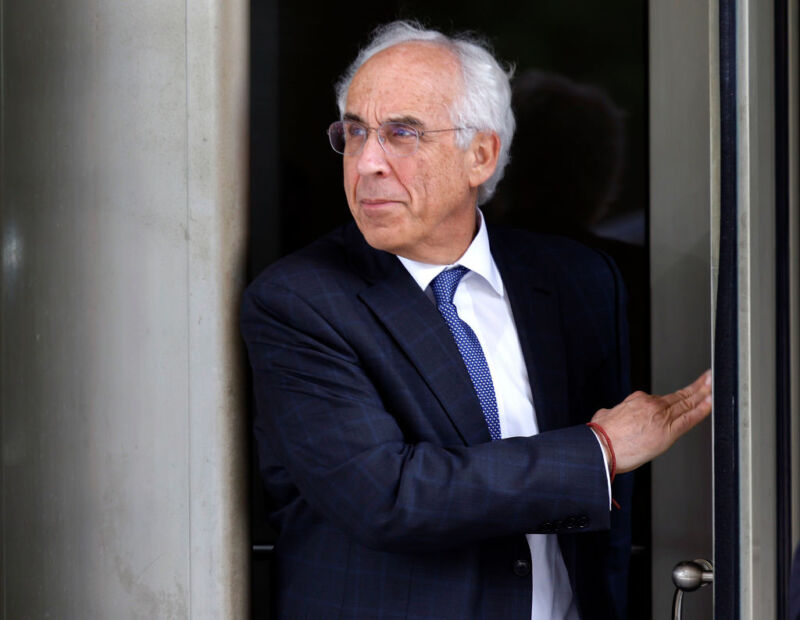
Enlarge / Andrew J. Pincus, attorney for TikTok and ByteDance, leaves the E. Barrett Prettyman US Court House with members of his legal team as the U.S. Court of Appeals hears oral arguments in the case TikTok Inc. v. Merrick Garland on September 16 in Washington, DC.
The fight to keep TikTok operating unchanged in the US reached an appeals court Monday, where TikTok and US-based creators teamed up to defend one of the world's most popular apps from a potential US ban.
TikTok lawyer Andrew Pincus kicked things off by warning a three-judge panel that a law targeting foreign adversaries that requires TikTok to divest from its allegedly China-controlled owner, ByteDance, is "unprecedented" and could have "staggering" effects on "the speech of 170 million Americans."
Pincus argued that the US government was "for the first time in history" attempting to ban speech by a specific US speaker—namely, TikTok US, the US-based entity that allegedly curates the content that Americans see on the app.
The government justified the law by claiming that TikTok may in the future pose a national security risk because updates to the app's source code occur in China. Essentially, the US is concerned that TikTok collecting data in the US makes it possible for the Chinese government to both spy on Americans and influence Americans by manipulating TikTok content.
But Pincus argued that there's no evidence of that, only the FBI warning "about the potential that the Chinese Communist Party could use TikTok to threaten US homeland security, censor dissidents, and spread its malign influence on US soil." And because the law carves out China-owned and controlled e-commerce apps like Temu and Shein—which a US commission deemed a possible danger and allegedly process even more sensitive data than TikTok—the national security justification for targeting TikTok is seemingly so under-inclusive as to be fatal to the government's argument, Pincus argued.
Jeffrey Fisher, a lawyer for TikTok creators, agreed, warning the panel that "what the Supreme Court tells us when it comes to under-inclusive arguments is" that they "often" are "a signal that something else is at play."
Daniel Tenny, a lawyer representing the US government, defended Congress' motivations for passing the law, explaining that the data TikTok collects is "extremely valuable to a foreign adversary trying to compromise the security" of the US. He further argued that a foreign adversary controlling "what content is shown to Americans" is just as problematic.
Rather than targeting Americans' expression on the app, Tenny argued that because ByteDance controls TikTok's source code, the speech on TikTok is not American speech but "expression by Chinese engineers in China." This is the "core point" that the US hopes the appeals court will embrace, that as long as ByteDance oversees TikTok's source code, the US will have justified concerns about TikTok data security and content manipulation. The only solution, the US government argues, is divestment.
TikTok has long argued that divestment isn't an option and that the law will force a ban. Pincus told the court that the "critical issue" with the US government's case is that the US does not have any evidence that TikTok US is under Chinese control. Because the US is only concerned about some "future Chinese control," the burden that the law places on speech must meet the highest standard of constitutional scrutiny. Any finding otherwise, Pincus warned the court, risked turning the First Amendment "on its head," potentially allowing the government to point to foreign ownership to justify regulating US speech on any platform.
But as the panel explained, the US government had tried for two years to negotiate with ByteDance and find through Project Texas a way to maintain TikTok in the US while avoiding national security concerns. Because every attempt to find a suitable national security arrangement has seemingly failed, Congress was potentially justified in passing the law, the panel suggested, especially if the court rules that the law is really just trying to address foreign ownership—not regulate content. And even though the law currently only targets TikTok directly, the government could argue that's seemingly because TikTok is so far the only foreign adversary-controlled company flagged as a potential national security risk, the panel suggested.
TikTok insisted that divestment is not the answer and that Congress has made no effort to find a better solution. Pincus argued that the US did not consider less restrictive means for achieving the law's objectives without burdening speech on TikTok, such as a disclosure mechanism that could prevent covert influence on the app by a foreign adversary.
But US circuit judge Neomi Rao pushed back on this, suggesting that disclosure maybe isn't "always" the only appropriate mechanism to block propaganda in the US—especially when the US government has no way to quickly assess constantly updated TikTok source code developed in China. Pincus had confirmed that any covert content manipulation uncovered on the app would only be discovered after users were exposed.
"They say it would take three years to just review the existing code," Rao said. "How are you supposed to have disclosure in that circumstance?"
"I think disclosure has been the historic answer for covert content manipulation," Pincus told the court, branding the current law as "unusual" for targeting TikTok and asking the court to overturn the alleged ban.
The government has given ByteDance until mid-January to sell TikTok, or else the app risks being banned in the US. The appeals court is expected to rule by early December.